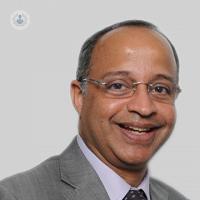Otosclerosis: a common cause of hearing loss in young adults
Autore:Otosclerosis is a condition that is a common cause of deafness in young adults, and occurs when the stirrup bone within the ear fuses with the surrounding bone, meaning that it can no longer move freely, and sound can no longer be transmitted effectively.
Otosclerosis affects around 0.3 per cent of the population, and is usually passed on genetically, with around a 50 per cent chance of developing otosclerosis if one of your parents has the condition. Hearing problems are usually noticed in the 20s and 30s, and gradually get worse with age.
Here, leading consultant ENT (ear, nose and throat) surgeon, Mr Abhijeet Parikh, helps us to understand this condition.

What are the symptoms of otosclerosis?
The effects of otosclerosis are usually first noticed as a young adult aged in the 20s and 30s. The condition can affect one or both ears. The following symptoms may be experienced:
- gradual hearing loss, that gets worse over time
- difficulty hearing whispers and quiet sounds
- difficulty hearing deep sounds
- your own voice sounding loud to you
- tinnitus (hearing hissing, whistling or buzzing sounds)
- easier to hear when there is background noise
- dizziness
The condition is more common in females than in males, and can often appear during pregnancy or after giving birth.
How is otosclerosis treated?
Otosclerosis is treated either with a hearing aid, or with surgery. With surgery, the affected, fused bone is removed and an artificial prosthesis put in place. The operation is called a stapedotomy.
A stapedotomy is carried out under general anaesthetic. The stirrup bone is approached via a cut made in the ear canal. The operation is usually carried out as a day case procedure, meaning you won’t be required to stay in hospital overnight and will be able to return home the same day. The procedure has a success rate of around 90 per cent though there is a two per cent risk of developing deafness in the ear that is operated on.
If you are concerned about your hearing, make an appointment with Mr Abhijeet Parikh, who will be able to diagnose and treat the problem.


